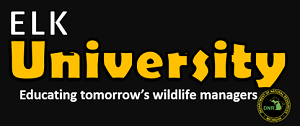With the start of the school year fast approaching for many, don’t forget to include Michigan’s wildlife in your class plans.
The DNR offers a variety of wildlife classroom curricula at the elementary, junior high and high school levels, and each program is developed to fit current state educational standards. Better yet, they're free to educators! Topics include:
- Elk University. One hundred years ago, wild elk were brought to Michigan to re-establish the state’s elk population. High school students are put in the role of wildlife managers, while learning about this conservation success story through Elk University. These lessons also include Michigan history, forest management and social considerations for wildlife management.
- A Year in the Life of a Michigan Black Bear. Sixth-, seventh- and eighth-grade students have the chance to learn all about black bears in Michigan – from their life history to how the DNR manages populations – in this curriculum. Students also get to “follow” black bear movements in Michigan by looking at actual location data from collared bears.
- Wondrous Wetlands and Waterfowl. Middle schoolers can get an introduction to wetland habitats with this program. These lessons have activities about wetlands and the ducks, geese and swans that live in Michigan, and give students an opportunity to look at how different land uses affect wildlife habitats, including wetlands.
- Go Wild for Michigan’s Wildlife. This curriculum introduces elementary-age students to a variety of species found throughout Michigan and their supporting habitats. Materials include sets of Critter Cards for each student to keep; however, those sets are limited and are issued on a first-come, first-served basis to Michigan educators who register. All registered educators will receive an electronic copy of the Critter Cards to use.
For more information, including how to register, visit michigan.gov/dnreducation or contact Hannah Schauer at 517-388-9678.
